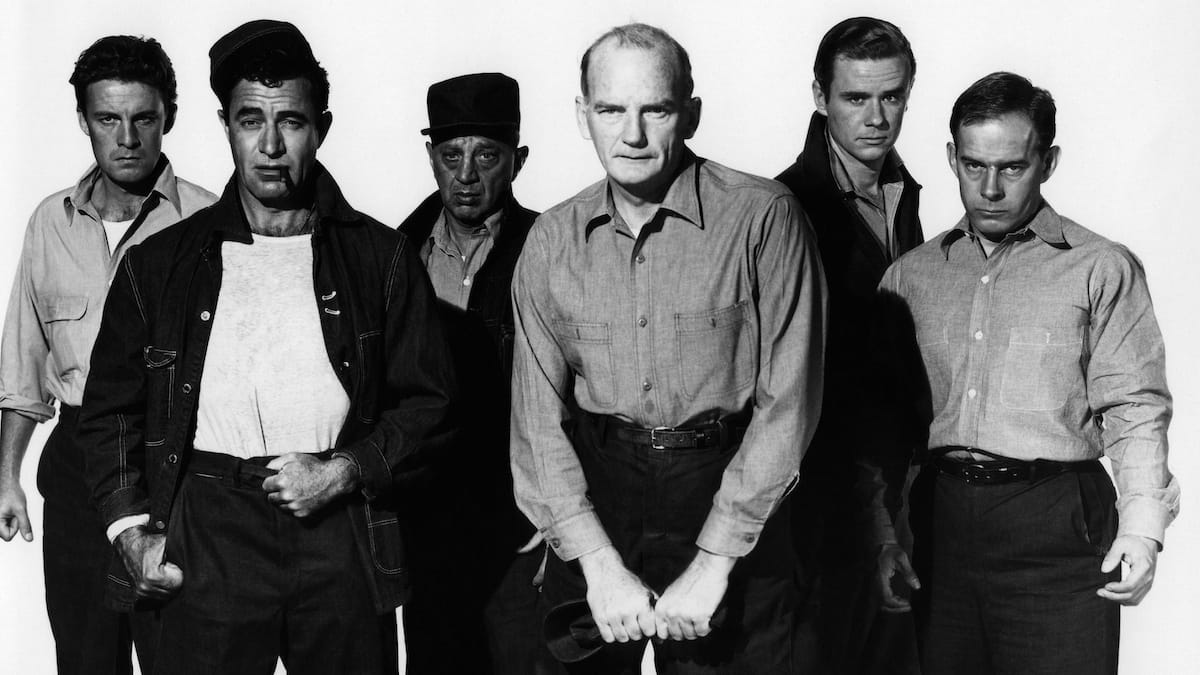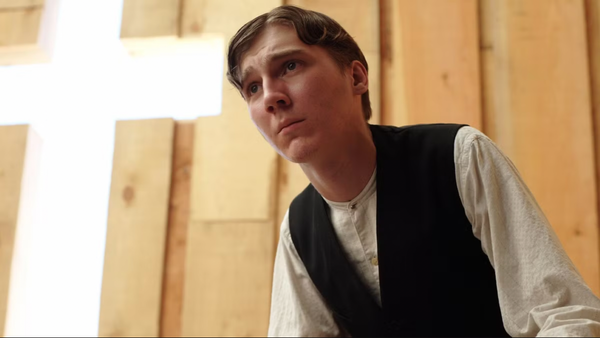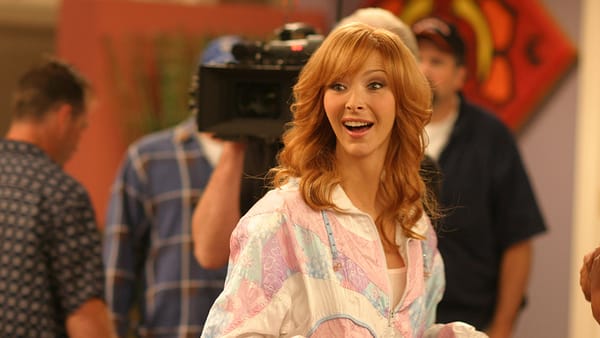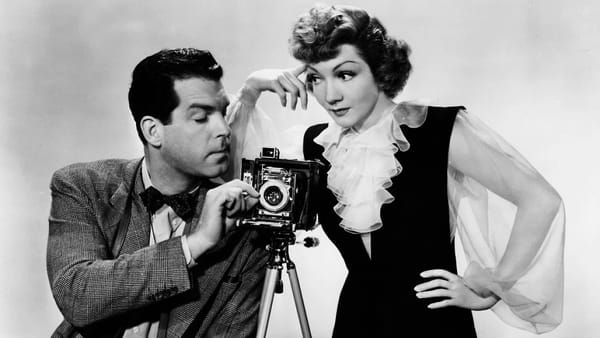Hugo Fregonese at Il Cinema Ritrovato

Promotional picture for My Six Convicts (1952)
One of the most striking sections of this year’s edition of Il Cinema Ritrovato, the repertory film festival that takes place annually in Bologna, Italy, was the series on director Hugo Fregonese. Born in Argentina but working in Hollywood in the years he made most of the films screened at the festival, the director comes across as an artist whose work is particularly ripe for rediscovery due to its socially conscious nature and often daringly progressive discourse.
One Way Street (1950) recalls no less than Peter Weir’s Witness (1980) in its story of a doctor (played with heartbreaking bitterness and pent-up emotion by James Mason) forced to leave his film noir world of violence and duplicity to spend a few days stranded in a small Mexican village. There, an easier life is possible, but the proud foreigner resists it. Can he just not let go of his plans? Or is he scared of this unexpected happiness? Like Weir’s film, One Way Street hinges on a difficult, humbling perspective shift, and several of Fregonese’s films likewise are about the ways in which one person presents themselves to the world and to themselves, the narratives we and others build up about who we are, and whether they can be changed.
Joel McCrea’s Chuck Conner in the much more comical Saddle Tramp (1950) has the very opposite temperament as Mason’s doctor. Rather than resist chance, he willfully adapts to anything that comes his way — even when it consists of four children to suddenly take care of as his own after his best friend dies in an accident. This is a happy-go-lucky film almost entirely devoid of the tension and psychological torment that makes One Way Street so compelling; here, it is the ease with which Chuck moves on from things that gives the films its strange, compelling momentum. The man briefly feels guilty about the death of his friend, since it was his horse that killed him, but even this feeling he quickly lets go of — and we watch, terrified that such a mature and healthy perspective on things might be the thing that will come under threat here. It doesn’t, not really, though Chuck does have to make some choices, commit and go beyond the “why not” approach that has served him well this far. In a quieter, much less tragic way than One Way Street, this is also a film about change.
Apache Drums (1951) tackles the same topic in a much more ambiguous, grown-up way, as it brings the notion of public opinion into the mix: if others are unwilling to let go of their very fixed idea of you, is trying to change even worth it? Crucially, Fregonese’s film isn’t about forgiveness per se: anti-hero Sam Leeds (Stephen McNally) is thrown out of town for being a gambler, and though he must have betrayed the trust of a few people in the process, he hasn’t done anything so evil that it could never, under any circumstances, be pardoned. The problem, then, is the repetition; the way Sam disappoints people again and again. When he spots a group of Mescalero Apaches preparing for attack while on his way out of the town, he retraces his steps in order to warn everyone. But like the boy who cried wolf, he isn’t believed.
Apache Drums plays with our expectations of the Western to bring into relief the forces that lead people to act a certain way, and which do not simply come down to their inherent, irreducible identity. Sam behaves like he does for a number of reasons — one of them being that he does not think gambling is all that bad. He never states this openly, but his generally disinterested response to the outrage of others sure seems to indicate a more liberal view of such things. The biggest tell, however, is the presence in the story of a character who represents everything Sam isn’t. Joe Madden (Willard Parker), the town’s mayor, is an almost cartoonishly “good” man: extremely earnest, built like a tank, an eyebrow constantly raised in an expression of righteous concern, he is also Sam’s rival for the affections of Sally (Coleen Gray). Or is he? Sam believes so, but despite her grievances with him, she has no real interest in Joe Madden. In her case, too, general opinion is quick to put people into boxes they do not themselves choose to occupy.
The most overtly political of the Fregonese films I’ve seen in Bologna, My Six Convicts (1952) pushes that line of inquiry even further by bringing it down into gritty, then-contemporary reality, as opposed to the test tube of the Western. A neatly plotted, polished prison drama, the film follows a psychologist (John Beal) who goes to work inside a jail, hoping to help fix the broken minds inside it. After he gains the (very conditional) trust of the convicts he hires to help him do psychological tests on the other inmates, he quickly realises that this place and the people who put people in it have no real faith or interest in rehabilitation. The anger issues that routinely push some prisoners to violence are not treated. The more obedient ones do not fare much better, quietly doing their time only to find that they now have more of a life inside rather than outside, where nobody knows them or wants to approach them. One strike, you’re out. A criminal is a criminal for life.
And then there are the psychopaths and the true rebels, the ones who are under no illusions about how things really work here. They master better than anyone else the art of looking after their own interests, in any situation. The film does not deny that this attitude is in some way a sad consequence of fear and trauma, of difficult childhoods or other adverse life experiences. But as the psychologist grows disillusioned about what he can really achieve, the inmates’ habit of keeping their cards close to their chests looks more and more like an essential survival skill. The psychologist is more impressed than angered by the ingenious ways his convicts find to make his little social experiment also work for them. Fregonese frames their self-regarding approach as a peculiar but undeniable sign of their sense of self-worth, their maturity and courage. Fiercely and in their own small ways, the convicts resist as much as they can the mechanisms of exploitation that rule a world where they know nothing is free.
Money rules the world to the point where it can override gut feelings, instincts and values in Fregonese’s Blowing Wild (1952). Set in an unnamed country in South America, this Western stars Gary Cooper as Jeff Dawson, a sensible but penniless man who ultimately and reluctantly agrees to deliver unstable and highly explosive nitroglycerin for a fee — just like Yves Montand in Henri-Georges Clouzot’s phenomenal film The Wages of Fear (1953). But his troubles do not stop there: this dangerous mission is only a prelude into a world ruled by oil, where it almost seems as though the fumes emanating from the substance have gone to people’s heads. Jeff’s pragmatic approach to surviving and making money brings him into a love triangle he wants no part of, and gets him involved with a young woman he agrees to help out. In both storylines, it is difficult to tell where business ends and feelings begin, and there is a psychosexual, almost hallucinatory quality to the film in the figure of Barbara Stanwyck’s Marina Conway. Passionately in love with Jeff but married to his rich friend Paco (Anthony Quinn), she is attracted to oil as much as she is to Jeff, torn between money and love and unwilling to compromise.
In a world where money can buy anything and people have to sell their souls to survive, sticking to your values could be something to be admired, whatever those values might be. Fregonese’s incredibly bold The Raid (1954) uncomfortably puts this idea to the test as it focuses on a group of soldiers who do not have justice, history, or even our sympathy on their side. Major Neal Benton (Van Heflin) leads a group of Confederate soldiers who plan a raid on an American town, hoping to rob the local bank to help replenish the resources of their losing army, and to wreak havoc as revenge for an earlier defeat. The extensive preparation requires Benton to infiltrate the town incognito — he pretends to be a Canadian businessman — and as he mingles with the perfectly nice local population, we naturally hope he will change his mind and call off the attack. Do all sides in wars find themselves forced to do things they wouldn’t normally defend — cause violence and mayhem, betray the trust of friends and lovers — in service of a perceived greater good? Does every worthy cause have collateral victims, or are the bad guys the only ones who believe so?
The line between a good and a bad person is most blurred in Black Tuesday (1954), an ensemble film noir led by Canelli, a violent convict (Edward G. Robinson) who escapes death row at the very last moment and takes along five hostages for protection. But the film’s pessimism isn’t to do with human nature, as much as it is with the corners people are forced into by a largely uncaring, unforgiving world. Canelli is repulsive because he refuses to feel bad for the hurt he causes others, so convinced he is that it’s either him, or them. The hideout in which they all hide from the police becomes, under his coldly pragmatic eye, a place where decency turns into an illusion easily dispelled, and each character’s personal interests become exposed. In that light, everyone looks more or less ugly, because everyone just wants to survive. Are there simply no inherently bad actions? Can everything be justified? Rather than moral purity, Fregonese’s film suggests that perhaps the best we can hope for are small adjustments in our actions.
The films highlighted here do not have a distinctive visual language unique to their director, the way the Budd Boetticher westerns rediscovered in Bologna a few years ago do. What sets them apart instead is the way they reverse, undermine or tinker with the tropes of whatever genre they belong to, always to better highlight the humanity of their characters. However, more than mere fellow feeling or any kind of instinctual sense of recognition between strangers, the humanity in Fregonese’s films is found precisely in the tug of war between the self and the world. It is every person’s right for self-determination, constantly challenged by the obstacles that naturally come in the way: chance, our responsibility to others, their perception of ourselves. All things which are bound up in a penal system that, as Fregonese sees it, is designed to take that right away from us.



